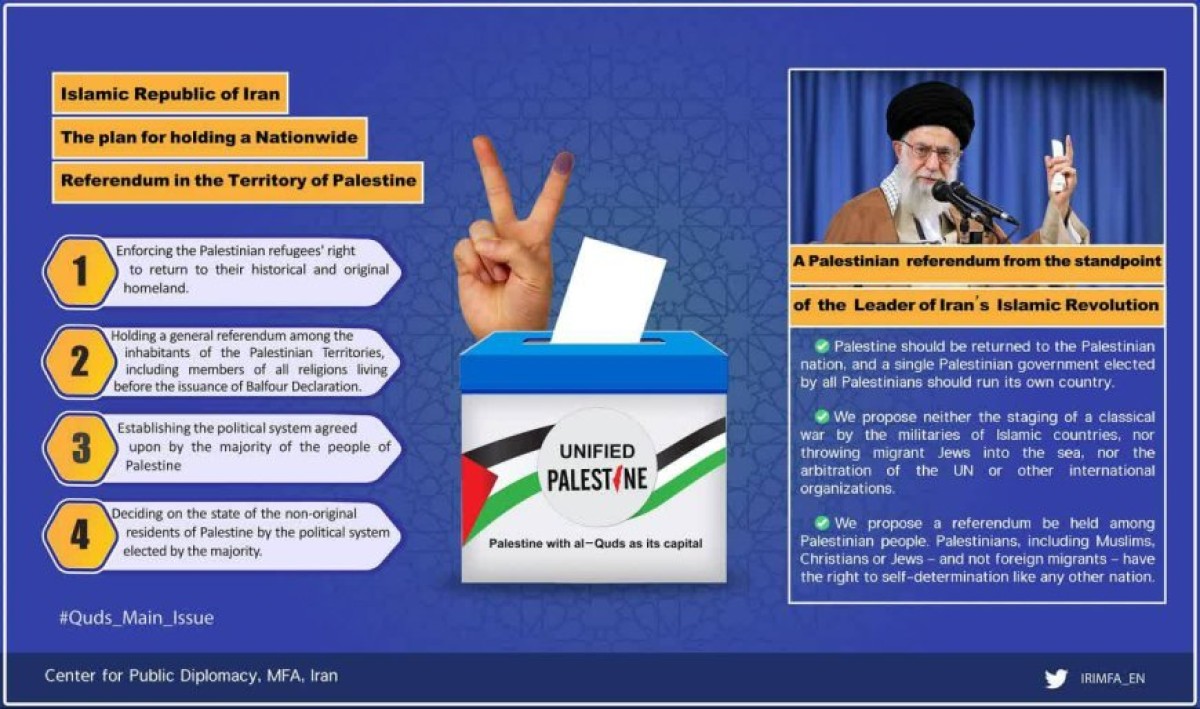 260
260
A Democratic Solution for Palestine: Examining Iran's Referendum Proposal
The Supreme Leader of Iran, Imam Khamenei, has presented a groundbreaking solution to the Palestinian question, advocating for a democratic referendum to determine the future political system of the country. This proposal, which aligns with principles of self-determination and international law, has been repeatedly emphasized by Ayatollah Khamenei and formally registered with the United Nations. It is highly crucial to understand the significance of this proposal and its potential.
By: H. Zaïm-Bashi
The Iranian Plan and Its Diplomatic Reception:
On August 19, 1991, Iran's Supreme Leader, in a gathering of former war prisoners from the Iran-Iraq conflict, introduced the idea of a referendum in Palestine as a viable solution to the ongoing conflict. He further emphasized the need for the Israeli regime to disintegrate, allowing the rightful owners of the land to form a democratic government where Muslims, Christians, and Jews could peacefully coexist. This practical solution was once again reaffirmed on November 28, 2023, when Ayatollah Khamenei reiterated his belief in the referendum and the importance of considering the political will of those who live in Palestine. By pointing to the ideas of Gamal Abdel Nasser, the former Egyptian president, who advocated for throwing Zionists and Jews into the sea, the Iranian leader explicitly rejected the notion and rather reasserted his solution of conducing a democratic revolution.
The Significance of a Democratic Referendum:
The recent Israeli war on Gaza has demonstrated the Palestinian resistance's ability to effectively challenge and defeat Israel. This achievement, coupled with the Iranian leader's endorsement of a referendum, underscores Tehran's commitment to a democratic solution to end over seven decades of Israeli atrocities against Muslims, Christians, and even Jews. The referendum proposal offers a tangible path forward, capable of benefiting all those living in the Gaza Strip, the West Bank, and the 1948-occupied territories.
The International Reception and Challenges:
Iran's referendum plan has been presented in numerous diplomatic forums, garnering attention from world political officials. However, despite its democratic nature, the plan has faced resistance from Western governments, which argue for a two-state solution that is contingent upon Israeli agreement. Yet, the Israeli regime's stiff refusal to accept even the two-state solution has effectively stymied peace progress. This raises questions about the true nature of democracy as perceived by Western countries, where the will of one party can undermine the aspirations of an entire region.
Formalizing the proposal at the United Nations:
To ensure the recognition and implementation of the referendum plan, the Islamic Republic of Iran officially submitted its proposal, titled "Plan for holding a national referendum in the Palestinian territories," to António Guterres, the Secretary-General of the United Nations, on November 1, 2019. Iran's proposal references the fundamental democratic principle of self-determination, as enshrined in international law and supported by the International Court of Justice. It argues that the Palestinian people's right to self-determination has been consistently denied, necessitating international intervention to rectify this injustice.
The Four Axes of Iran's Referendum Plan:
The Iranian proposal outlines four key components of the referendum plan. Firstly, it calls for the return of Palestinian refugees from around the world, ensuring their inclusion in the decision-making process. Secondly, the plan advocates for a referendum conducted exclusively by the Palestinian people, Muslims, Christians, and Jews alike, thus excluding those who occupied the land after 1948. Thirdly, it emphasizes the formation of a political system by the indigenous Palestinian people, enabling them to shape their own destiny. Lastly, the plan addresses the concerns surrounding non-Palestinian populations and entrusts the new political system with determining their status.
Implementing the Referendum Plan:
The United Nations General Assembly's resolution "III 194A/RES" regarding the right of Palestinian refugees to return serves as the legal basis for Iran's comprehensive plan. To facilitate participation, an international census project will be undertaken, enabling the registration of all Palestinian refugees in the referendum. An international organization, comprising representatives of the Palestinian people, will oversee this project's implementation. Simultaneously, an international committee, led by the United Nations and including Palestinian representatives, will focus on Palestine's historical and territorial issues, particularly the status of Bait ul-Muqaddas [Jerusalem]. Additionally, an international fund will be established to support the plan's execution, with contributions from the international community.
Conclusion:
The recent military victory of Palestinian resistance groups has clearly demonstrated their capacity to defeat the Zionist regime, while Iran's Supreme Leader's endorsement of a democratic referendum underscores the Islamic Republic of Iran's commitment to a peaceful resolution. The responsibility now rests with the Zionist regime and its Western supporters, particularly the United States, to make a choice. Failure to embrace a democratic option will inevitably lead to the implementation of alternative measures, with any resulting ramifications lying solely at their feet
 260
260
Comment
Post a comment for this article